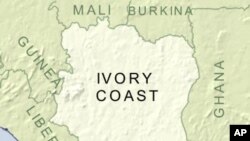Pressure is mounting for Ivory Coast to hold its long-delayed presidential elections as soon as possible and begin the next phase of rebuilding and reunifying the once stable West African nation.
Ivorian mediators meeting in Ouagdougou last week decided the long-delayed presidential election should take place by end of February or early March.
The vote is an attempt to find a lasting political solution to nearly a decade of internal conflict. It was supposed to take place November 29, but financial problems and irregularities with the voter list caused it to again be pushed back.
This week, the U.N. Security Council urged Ivory Coast to set and respect a new date for elections. Ambassador Michel Kafando of Burkina Faso holds the Council's rotating presidency this month.
"The members of the Council call on the Ivorian stakeholders to pursue their efforts in order to hold credible elections at the earliest possible date," he said.
The word credible is key, and the publication and approval of the provisional voter list have been the most recent hurdles. The provisional list contains the names of 5.3-millon voters, but the status of an additional one million voters is being disputed.
International analysts say an inclusive voter list is crucial to holding free and fair elections and resolving the issue of nationality in Ivory Coast, which has a large immigrant laborer population.
Questions of nationality were divisive during the civil war that cut the nation in half in 2002, and they remain sensitive. Voter registration issues, particularly issues of nationality and voter eligibility, have prompted Ivory Coast to push back the election several times since President Laurent Gbagbo's mandate ran out in 2005.
Though Mr. Gbagbo has been accused of stalling elections to remain in power, he blamed technical problems for the most recent setback.
Arriving in Burkina Faso last week, Mr. Gbagbo said that holding a successful, peaceful poll is more important than rushing into a hasty, and potentially divisive, one.
Mr. Gbagbo says we want to hold elections that do not lead to another outbreak of war. Better to hold elections late and not have a conflict, he says, than to have elections quickly that result in deaths. He says we are tired of crying for our dead.
Countries like the United States and France have called on Ivory Coast to hold elections as soon as possible, and opposition members have urged the country's Independent Electoral Commission to set a new date.
In Ouagadougou last week, mediators set forth a timetable for the poll that included publishing a final voter list in January 2010 and distributing voter cards in February.
Leaving the meeting, former rebel leader and current Prime Minister Guillaume Soro emphasized the progress being made.
Soro says for once he is satisfied the committee specified in such a clear and transparent manner the steps remaining to be taken and established a timeline to accomplish them.
Also in attendance were top Ivorian opposition candidates, Henri Konan Bédié and Alassane Ouattara.
Ouattara says they were very disappointed that the November 29 poll date was not respected. He says after much consultation with the Independent Electoral Commission about the reasons for the postponement, mediators have done all they can to avoid another delay.
Ouattara said he was confident the elections would take place by the end of February or early March.
Analysts say holding elections will be a beginning rather than an end to the work that needs to be done to rebuild and truly reunify Ivory Coast, once a regional economic powerhouse. For example, Ivory Coast is the world's top cocoa producer, but the political stalemate has prevented much-needed reforms to the cocoa sector.
International Crisis Group's West Africa Director, Richard Moncrieff, said that though successful elections could prompt international investors and donors to reinvest in Ivory Coast, the country will still face a number of problems, including disarming the country's former rebel factions in the North and fully resolving questions of national identity, such as who is Ivorian and who can own land.
"I would also point to a third problem which is the centralized nature of power in Ivory Coast, the fact that people who lose in political contests tend to lose everything, the winner-takes-all syndrome, and connected to that, the corruption that has been at the heart of the Ivorian state for decades," he said.
Though the elections could mark a symbolic end to the crisis, he said they will not be a "fix-all."




